The Death of Ivan Ilych Leo Tolstoy - Ivan Ilyich lives a carefree life that is "most simple and most ordinary and therefore most terrible". Like everyone he knows, he spends his life climbing the social ladder. Enduring marriage to a woman whom he often finds too demanding, he works his way up to be a magistrate, thanks to the influence he has over a friend who has just been promoted, focusing more on his work as his family life becomes less tolerable.While hanging curtains for his new home one day, he falls awkwardly and hurts his side. Though he does not think much of it at first, he begins to suffer from a pain in his side. As his discomfort grows, his behavior towards his family becomes more irritable. His wife finally insists that he visit a physician. The physician cannot pinpoint the source of his malady, but soon it becomes clear that his condition is terminal. Confronted with his diagnosis, Ivan attempts every remedy he can to obtain a cure for his worsening situation, until the pain grows so intense that he is forced to cease working and spend the remainder of his days in bed. Here, he is brought face to face with his mortality and realizes that, although he knows of it, he does not truly grasp it.During the long and painful process of dying, Ivan dwells on the idea that he does not deserve his suffering because he has lived rightly. If he had not lived a good life, there could be a reason for his pain; but he has, so pain and death must be arbitrary and senseless. As he begins to hate his family for avoiding the subject of his death, for pretending he is only sick and not dying, he finds his only comfort in his peasant boy servant, Gerasim, the only person in Ivan's life who does not fear death, and also the only one who, apart from his own son, shows compassion for him. Ivan begins to question whether he has, in fact, lived a good life.In the final days of his life, Ivan makes a clear split between an artificial life, such as his own, which masks the true meaning of life and makes one fear death, and an authentic life, the life of Gerasim. Authentic life is marked by compassion and sympathy, the artificial life by self-interest. Then "some force" strikes Ivan in the chest and side, and he is brought into the presence of a bright light. His hand falls onto his nearby son's head, and Ivan pities his son. He no longer hates his daughter or wife, but rather feels pity for them, and hopes his death will release them. In so doing, his terror of death leaves him, and as Tolstoy suggests, death itself disappears.
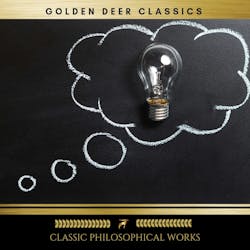
Classic Philosophical Works (Thus Spoke Zarathustra, The Apology of Socrates, Tao Te Ching...)
Plato, Friedrich Nietzsche, Herman Hesse, Leo Tolstoy, Immanuel Kant, Sun Tzu
audiobook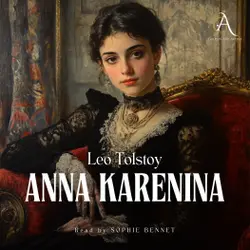
Anna Karenina - Audiobook
Leo Tolstoy, Classic Audiobooks
audiobook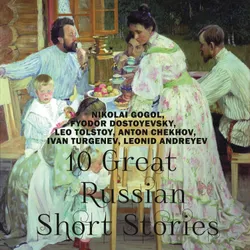
10 Great Russian Short Stories : Nikolai Gogol, Fyodor Dostoevsky, Leo Tolstoy, Anton Chekhov, Ivan Turgenev, Leonid Andreyev
Nikolai Gogol, Fyodor Dostoevsky, Leo Tolstoy, Anton Chekhov, Ivan Turgenev, Leonid Andreyev
audiobook
90 Masterpieces You Must Read (Vol.1) : Novels, Poetry, Plays, Short Stories, Essays, Psychology & Philosophy: The Madman, Moby-Dick, Siddhartha, Crime and Punishment, Hamlet, Great Expectations, Little Women, Meditations, The Einstein Theory, Heart of Darkness, The Red Badge of Courage
Walt Whitman, Herman Hesse, George Eliot, Kahlil Gibran, Anton Chekhov, Herman Melville, Oscar Wilde, Fyodor Dostoevsky, Nikolai Gogol, James Joyce, Henry David Thoreau, William Shakespeare, T. S. Eliot, John Keats, Charles Baudelaire, Walter Scott, Daniel Defoe, Louisa May Alcott, Jane Austen, Charlotte Brontë, Emily Brontë, Anne Brontë, Leo Tolstoy, Benito Pérez Galdós, William Makepeace Thackeray, Pierre Choderlos de Laclos, R.D. Blackmore, Alexandre Dumas, Marcel Proust, D. H. Lawrence, Charles Dickens, Thomas Hardy, Henry James, Guy de Maupassant, Princess Der Ling, Victor Hugo, Juan Valera, Anthony Trollope, Stephen Crane, E. M. Forster, Theodore Dreiser, Margaret Cavendish, Upton Sinclair, Plato, Apuleius, Marcus Aurelius, Sun Tzu, Voltaire, Miguel de Cervantes, Giovanni Boccaccio, Frederick Douglass, Sigmund Freud, H. A. Lorentz, Wallace D. Wattles, James Allen, Agatha Christie, Arthur Conan Doyle, Joseph Conrad, H. P. Lovecraft, Washington Irving, Mary Shelley, H. G. Wells, Edgar Allan Poe, Ernest Hemingway, L. Frank Baum, Robert Louis Stevenson, Mark Twain, Selma Lagerlöf, Jack London, Jules Verne, Lewis Carroll, Frances Hodgson Burnett, Rudyard Kipling, George Bernard Shaw, Soseki Natsume, Johann Wolfgang Goethe, Edgar Rice Burroughs, Brothers Grimm, Hans Christian Andersen
book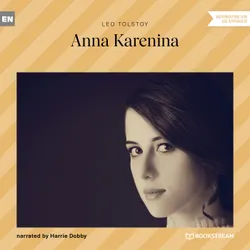
Anna Karenina (Unabridged)
Leo Tolstoy
audiobook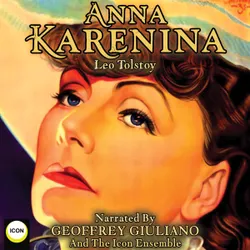
Anna Karenina
Leo Tolstoy
audiobookbook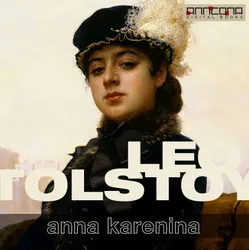
Anna Karenina
Leo Tolstoy
audiobookbook
War and Peace
Leo Tolstoy
audiobookbook
Anna Karenina (Part 6)
Leo Tolstoy
audiobook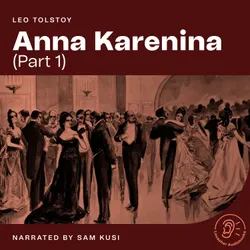
Anna Karenina (Part 1)
Leo Tolstoy
audiobook
50 Timeless Masterpieces (Volume 1) : Essential Classics for a Rich Literary Journey
Homer, Sun Tzu, Plato, Dante, Shakespeare, Miguel de Cervantes, John Milton, Daniel Defoe, Johann Wolfgang von Goethe, Jane Austen, Nikolai Gogol, Emily Brontë, Mary Shelley, Alexandre Dumas, Fyodor Dostoevsky, Charles Dickens, Victor Hugo, Nathaniel Hawthorne, Gustave Flaubert, Leo Tolstoy, Henrik Ibsen, Herman Melville, Mark Twain, Robert Louis Stevenson, Arthur Conan Doyle, Raymond Chandler, H. G. Wells, Joseph Conrad, Rudyard Kipling, Louisa May Alcott, L. Frank Baum, L. M. Montgomery, T. S. Eliot, Franz Kafka, James Joyce, Virginia Woolf, C. S. Lewis, Ernest Hemingway, Walt Whitman, Jack Kerouac, John Steinbeck, William Faulkner, Kate Chopin, Zora Neale Hurston, Margaret Mitchell, Sylvia Plath, Thomas Mann, Albert Camus, George Orwell
book
World's Greatest Classics in One Volume : Les Misérables, Hamlet, Jane Eyre, Ulysses, War and Peace, Art of War, Faust, Don Quixote, Bushido…
Johann Wolfgang von Goethe, Stendhal, Jules Verne, Gustave Flaubert, Lewis Carroll, Henrik Ibsen, Charles Dickens, Plato, Honoré de Balzac, Mark Twain, Harriet Beecher Stowe, Rabindranath Tagore, Fyodor Dostoyevsky, Walt Whitman, Niccolò Machiavelli, Oscar Wilde, Robert Louis Stevenson, James Fenimore Cooper, Edgar Allan Poe, William Shakespeare, Giovanni Boccaccio, Confucius, George MacDonald, Bram Stoker, Charlotte Brontë, Emily Brontë, Henry David Thoreau, Weedon Grossmith, Jack London, Henry James, Louisa May Alcott, Victor Hugo, Arthur Conan Doyle, Frances Hodgson Burnett, Joseph Conrad, Jane Austen, Herman Melville, George Eliot, Laurence Sterne, Thomas Hardy, Jonathan Swift, Edith Wharton, Benito Pérez Galdós, Daniel Defoe, Henry Fielding, Alexandre Dumas, Kalidasa, Kenneth Grahame, Marcel Proust, Willa Cather, Nathaniel Hawthorne, Homer, Gaston Leroux, Charles Baudelaire, Wilkie Collins, William Makepeace Thackeray, Voltaire, Kate Chopin, Apuleius, John Milton, Frederick Douglass, Laozi, John Keats, James Joyce, Ann Ward Radcliffe, Kahlil Gibran, Kakuzo Okakura, Soseki Natsume, Princess Der Ling, H. G. Wells, W. B. Yeats, J. M. Barrie, G. K. Chesterton, T. S. Eliot, L. M. Montgomery, C. S. Lewis, D. H. Lawrence, E. M. Forster, H. P. Lovecraft, Marcus Aurelius, Friedrich Nietzsche, Lewis Wallace, Ivan Turgenev, Anton Chekhov, Leo Tolstoy, Nikolai Gogol, Sir, George Bernard Shaw, Miguel de Cervantes, Mary Shelley, Cao Xueqin, Emile Zola, Válmíki, Bankim Chandra Chatterjee, P. B. Shelley, Elizabeth von Arnim, Herman Hesse, Dante, Pedro Calderon de la Barca, Sun Tzu, Inazo Nitobé
book
